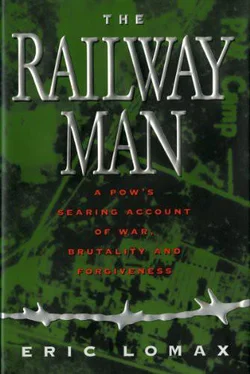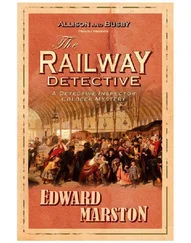Eric Lomax - The Railway Man
Здесь есть возможность читать онлайн «Eric Lomax - The Railway Man» весь текст электронной книги совершенно бесплатно (целиком полную версию без сокращений). В некоторых случаях можно слушать аудио, скачать через торрент в формате fb2 и присутствует краткое содержание. Город: New York, Год выпуска: 1995, ISBN: 1995, Издательство: W.W. Norton & Company, Жанр: Биографии и Мемуары, nonf_military, на английском языке. Описание произведения, (предисловие) а так же отзывы посетителей доступны на портале библиотеки ЛибКат.
- Название:The Railway Man
- Автор:
- Издательство:W.W. Norton & Company
- Жанр:
- Год:1995
- Город:New York
- ISBN:0393039102
- Рейтинг книги:4 / 5. Голосов: 1
-
Избранное:Добавить в избранное
- Отзывы:
-
Ваша оценка:
- 80
- 1
- 2
- 3
- 4
- 5
The Railway Man: краткое содержание, описание и аннотация
Предлагаем к чтению аннотацию, описание, краткое содержание или предисловие (зависит от того, что написал сам автор книги «The Railway Man»). Если вы не нашли необходимую информацию о книге — напишите в комментариях, мы постараемся отыскать её.
is a powerful tale of survival and of the human capacity to understand even those who have done us unthinkable harm.
The Railway Man — читать онлайн бесплатно полную книгу (весь текст) целиком
Ниже представлен текст книги, разбитый по страницам. Система сохранения места последней прочитанной страницы, позволяет с удобством читать онлайн бесплатно книгу «The Railway Man», без необходимости каждый раз заново искать на чём Вы остановились. Поставьте закладку, и сможете в любой момент перейти на страницу, на которой закончили чтение.
Интервал:
Закладка:
The life that awaited me if I had not broken from it can be guessed at in the story of the file on expanding shelter for our vehicles in the Edinburgh area. I wrote minutes, memos, drew up lists of suitable premises. In 1948 I went back briefly to the Post Office after leaving the army, after a war in which millions of people had died cruel and pointless deaths, in which I had been shattered psychically and physically. On my first day back in civilian employment the file on garage accommodation was solemnly handed to me. It had not been opened for almost a decade. Time had stopped in this fusty government office while for me it had accelerated beyond reason.
Some inkling of dread must have percolated into me back in 1936, because I decided to make another move. I realize now, looking back, that for all my conformity I was looking for something more satisfying, more wholly absorbing than the set lines of my life could offer; in my own way I was very ambitious. I decided to take evening classes in telegraphy and telephony. My father thought that this was most irregular, wanting to switch from the office grades to the technical, from the supervisory to the practical. We were staff, we did not work with our hands. But with that stubbornness which I would later learn much more about, I went ahead.
CHAPTER TWO
I GREW UP IN a world in which tinkering and inventing and making were honoured pastimes. My father, though he was not a telegraph engineer, liked to experiment with technical equipment. In the early 1920s he and his friends Mr Weatherburn and Mr Patrick were building a wireless, which they kept in Weatherbum’s house.
It sat on a table in a room cluttered with glass valves, flex, pliers, copper wire, soldering irons and screwdrivers. There was a strange burning metallic smell, a smell of glue and oil. I could touch the dark rolls of thick sticky tape, but was warned not to touch the big black dials with their pointers turned to the brass buttons set into the wood panel. Three beautifriUy-milled brass cylinders, detectors for those mysterious waves that I couldn’t see as they rolled into the lighted room, were set into the polished mahogany of the box. The front panel was studded with protruding, fragile looking valves, switches and dials, and polished brass terminals. I could see the delicate metal in the bulbs of the valves. The whole apparatus looked at once ridiculous and awesome. It was like an unfinished toy, but also an engineered aesthetic tool, something crafted and heavy. Its front sloped back like the stand used for the big Bible in church.
My father placed a pair of heavy headphones around my ears, and I heard, through the hiss and buzz of far-off energies, a disembodied human voice. Somewhere a long way away a man was sending his words into space and they were somehow being collected here and narrowed through my ears alone.
In the worst times, much later, when I thought I was about to die in pain and shock at the hands of men who could not imagine anything of my life, who had no respect for who I was or where I had come from, I might have wished that my father had had a different passion. But after the First War, technology was still powerful and beautiftil without being menacing. Who could have thought that radio telegraphy, a simple channelling of ethereal lines of force, could cause terrible harm? It was a wonderful instrument by which people could speak to each other, and I knew that up on the hill in Edinburgh Castle there was a station of the BBC speaking calmly and authoritatively through educated English voices about the weather, the news and the Empire.
By the time I started my own radio course in 1940 I had already heard Adolf Hitler’s voice coming out of my father’s radio, an endless rhythmic scream full of strange crescendos. Hitler was not only the most powerful man in Europe, he was also clearly mad. None the less the threat his voice contained seemed as far away as all radio voices.
I got stuck into the electrical rote-learning that the Post Office Telephones arranged for its staff. We had to memorize complicated circuits and patterns of valves. A typical exam question might be ‘Reproduce the Circuit for the No. 2A Switchboard’, which was a bit of a labyrinth. The radios of the late Thirties were large heavy pieces of equipment, not quite as massive and unwieldy as Mr Weatherburn’s home-made wireless, but solid and imposing for all that; and I began to learn how they worked and how they should be maintained. We also learned about telephones, morse signalling and telegraphy. I was moving on, but I can*t have been content.
My mentor in the Post Office, Bobby Kinghom, was a friend of the kind that a lonely young man makes in his first job: older, wise to the routines of the office, giving off the air of a vigorous, if slightly mysterious, life outside it. I knew he was interested in religion, and once I lent him my father’s copy of Hilaire Belloc’s The Path to Rome^ one of those accounts of conversion that English Catholics delight in. Kinghom never returned it, to my father’s considerable anger. But my colleague had, as it turned out, taken a very different path to Belloc’s.
My only vivid religious memory from my childhood is of being a choirboy in the Episcopal Church at the age of eleven or twelve. I remember the music and the division of the choir into cantoris and decani, and that I was assigned to the cantoris. What happened, therefore, came as much as a surprise to me as it did to my parents, who had grown used, if not exactly reconciled to my relentless exploration of Britain for unusual machines.
On summer evenings you could see a great variety of trains at a station in the west of Edinburgh called Dairy Road. It had an island platform in the middle of tracks that ran past it from east to west, and off beyond the tracks were engine sheds and repair works. Sometimes you would see outside its longest shed a string of pre-First-War engines, stubby six-wheeled locomotives of the defunct Caledonian Railway nose to tail with their high steam domes and thin quaint chimneys.
One Sunday, I stood on the island in the warm dusk, surrounded by empty tracks stretching off on either side, waiting for a train that might have some exotic engine at the head of it. The old railway systems were dissolving fast now, and anything might be coming through, a strange engine of the former London and North Western Railway, perhaps?
I was approached by an older man who struck up a conversation about trains and about recent sightings at this very station. He was a gangly clothes-pole of a man, a long coat flapping around his shins. I thought he was simply a fellow obsessive and we talked politely about rare southern birds and dying Highland breeds. He really did seem to know a great deal about locomotives. Then, once he had hooked me, the talk turned to religion, and he was so hypnotically persuasive that the transition didn’t seem abrupt. In those days, steam locomotion and the divine were not as far apart in my imagination as they should have been.
Today, a man accosting a youth at a spot like this would arouse suspicions of only one kind, but this man had no carnal intentions at all. He was simply after my soul. His name was Jack Ewart and he belonged to Charlotte Baptist Chapel, a famous independent evangelical church in Edinburgh. He could talk, he could seduce you with talk of love and compassion and salvation, that subtle mixture of flattery and fear that the apostle of any sect learns to use. I found myself, a lonely and impressionable young man, being drawn into the reassuring and comforting world that glowed in his voice. It seemed to offer fellowship and certainty.
Within a few weeks I had joined what was then a fundamentalist Christian sect. I had done exactly as my father told me to do.
I had left school, joined the Post Office and been a good son. Now I was doing something for myself.
Читать дальшеИнтервал:
Закладка:
Похожие книги на «The Railway Man»
Представляем Вашему вниманию похожие книги на «The Railway Man» списком для выбора. Мы отобрали схожую по названию и смыслу литературу в надежде предоставить читателям больше вариантов отыскать новые, интересные, ещё непрочитанные произведения.
Обсуждение, отзывы о книге «The Railway Man» и просто собственные мнения читателей. Оставьте ваши комментарии, напишите, что Вы думаете о произведении, его смысле или главных героях. Укажите что конкретно понравилось, а что нет, и почему Вы так считаете.












